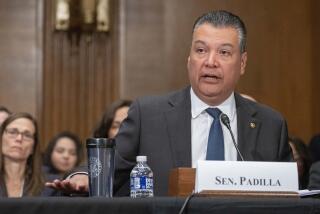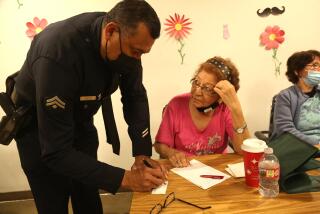Deceptive Practices on ‘900’ Phone Lines Hit : Marketing: A consumer group says calling the numbers often costs more and yields less than expected.
- Share via
Advertised pay-per-call “900” phone information numbers often employ deceptive marketing tactics and ultimately cost consumers more than expected while providing less information, according to a national survey of 144 such phone lines to be released today.
Consumer Action, a San Francisco-based group sponsoring the study, has asked telecommunications regulators to “stem the rip-offs” by enacting rules that would allow consumers to block 900 services, create uniform standards for advertising, require disclosure of costs and refunds, and develop enforcement powers to protect individuals from fraudulent 900 lines.
“There are no consumer protections in place for out-of-state 900 calls,” said Ken McEldowney, executive director of Consumer Action. “Since there are going to be more and more products delivered by the phone and billed by the phone, the Federal Communications Commission and the Public Utilities Commission are going to have to take responsibility to make sure consumers are not subjected to fraud and deception.”
The survey was the latest evidence of a growing public outcry over 900 services.
The pay-per-call industry was created in 1983 and now includes roughly 6,000 services, according to Larry Podell, publisher of the Audiotex Directory & Buyers Guide in Los Angeles.
But fraudulent and deceptive practices are growing at an equally brisk pace, according to consumer groups. The National Consumers League in Washington, for example, ranked pay-per-call services as the top emerging telemarketing scam of the 1990s.
“We have seen and heard from consumers on a number of issues,” said Linda Golodner, the league’s executive director. Among the main complaints: excessive costs, being put on hold and not disclosing costs up front.
Still, little has been done to combat the problems, industry experts said.
State and federal laws enacted in recent years provide at least limited protections from dial-a-porn numbers. But the courts have often blocked implementation of these laws, said Kathleen Flynn, a spokeswoman for Pacific Bell in Los Angeles. Pacific Bell has been in the forefront of fighting dial-a-porn and is seeking to block pornographic messages from its network altogether.
Consumer Action said it had been “overwhelmed by the slime” in the pornographic phone lines, but was much more concerned about marketing practices in the business and financial category. These are 900 lines that promise to repair credit, find jobs or provide “valuable” information about auctions, according to McEldowney.
“You can’t really criticize services like ‘dial-a-joke’ because some people might think it’s worth $2 a minute,” said Stephen B. Texeira, staff researcher at Consumer Action. “But when we started calling these (financial-oriented) numbers, it became very clear. We’d be on the phone for 10 minutes and get no information.”
Indeed, the Consumer Action survey found a wide array of phone lines that advertised services that were not provided or were only provided at an additional cost. The consumer group compiled a list of a dozen such lines that promised to provide everything from credit cards to jobs and loans.
In many cases, the phone lines advertised relatively low costs--such as $1 per minute--but sought to keep consumers on the line so long that the actual cost amounted to much more.
One such line promised to help individuals find government jobs at a cost of $2 per minute. However, all the tape-recorded voice offered was dozens of local phone numbers for government agencies that are “always hiring.” By the time the numbers were all slowly dispensed, the bill totaled $20, Texeira said. And, incidentally, all the numbers provided are listed in the phone book.
Others promised credit cards to those with credit problems. But the credit cards were either limited to buying products out of a single company’s catalogue, or they required consumers to guarantee repayment by depositing amounts in excess of their credit limits into accounts held by the issuing card company. And none of the cards was cheap. Nearly all required “processing fees” that ranged from $30 to $55, not to mention annual fees and high interest rates, Texeira said.
Additionally, Consumer Action said, services also often succumbed to a variety of other deceptions. These techniques included repeating information over and over; filling time with unnecessary chatter to keep callers on the phone running up higher fees; putting callers on hold; hanging up in the middle of a program so callers would call back; referring callers to another--and often more expensive--900 number to get the promised information, or only advertising the fee for the first minute, thereby masking the total price.
Consumer Action has compiled a booklet on common abuses and consumer remedies. It can be obtained by sending a self-addressed, stamped envelope to: 900 Fact Sheet, c/o Consumer Action, 116 New Montgomery St., Suite 233, San Francisco, Calif. 94105.
SOME OF THE WORST 900 LINES* Line: 1-900-988-1505 Claim: Credit for those with “no credit, bad credit. Guaranteed.” Actual: Provided four phone numbers of institutions that allegedly provide guaranteed loans. One firm required additional $55 fee and said only 70% of the applicants receive loans. Cost: $18 flat rate. Line: 1-900-USA-RICH Claim: “How to get free cash grants. Valuable Money Making Information and the ABC’s of receiving FREE money from the government.” Actual: Did not provide any information on how to get cash grants. Callers were told to call another 900 number--at a cost of $24.95--to get this information. Cost: $5** Line: 1-900-988-1717 Claim: “Did your last car payment seem too high?” Actual: No information given about car payments. Callers were told that many consumers failed to recover money owed to them from insurance policies. Callers were told to leave their name and address for “valuable information” about insurance rebates, but they were disconnected before given the opportunity to leave their names. Cost: $9.95 (flat rate) Line: 1-900-456-4995 Claim: “Credit cards. Guaranteed immediate issue. Pre-approved, regardless of your credit history.” Actual: Callers told to send name, address and phone number along with an additional $30 processing fee to get “IHS” credit card, which allows people to buy goods from the International Home Shopper catalogue. Cost: $49.95 (flat rate) Line: 1-900-420-3030 Claim: “Use the government’s own hot lines to start your career.” Actual: Provided dozens of local phone numbers, which are all available in the phone book for free, of government offices. “These agencies are always hiring,” the tape recording says. Cost: $20** * according to Consumer Action’s study. ** cost of calls billed on a per-minute basis is listed by the cost to Consumer Action when making the calls.
More to Read
Inside the business of entertainment
The Wide Shot brings you news, analysis and insights on everything from streaming wars to production — and what it all means for the future.
You may occasionally receive promotional content from the Los Angeles Times.










